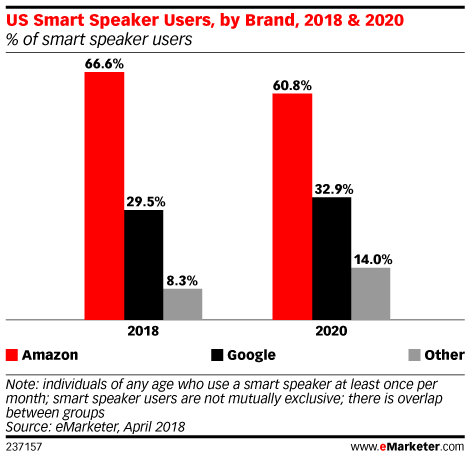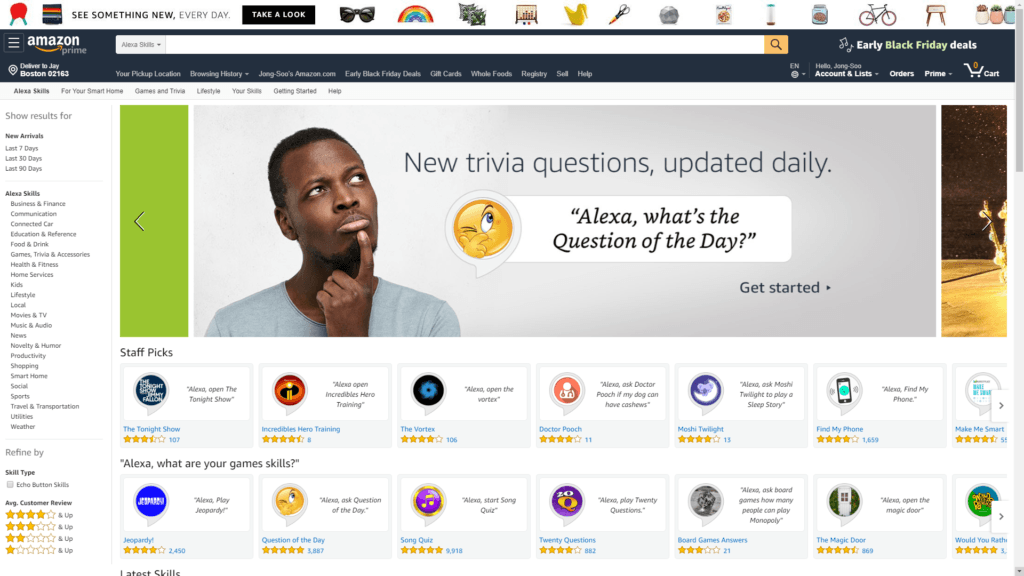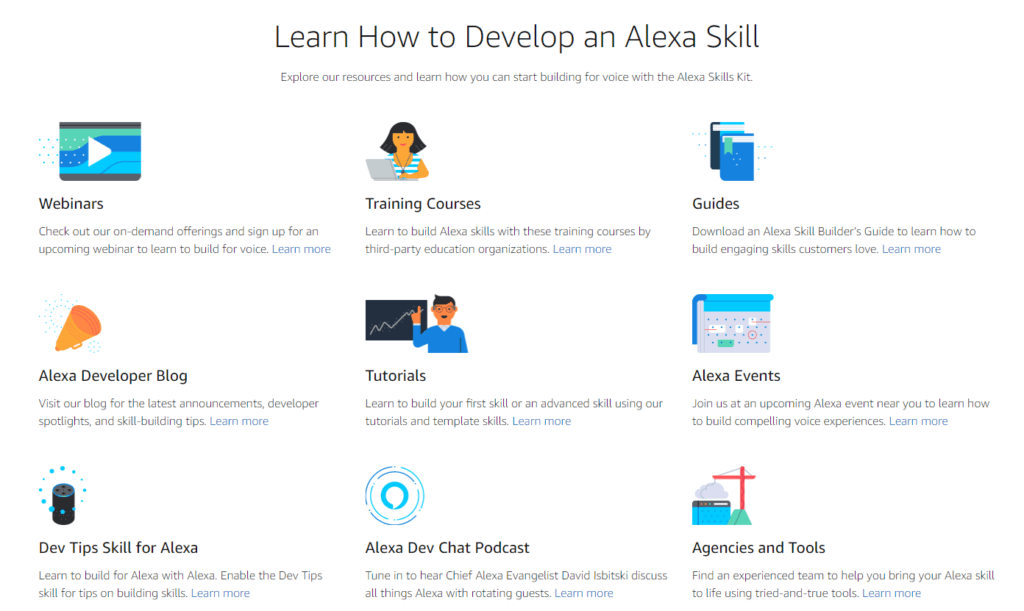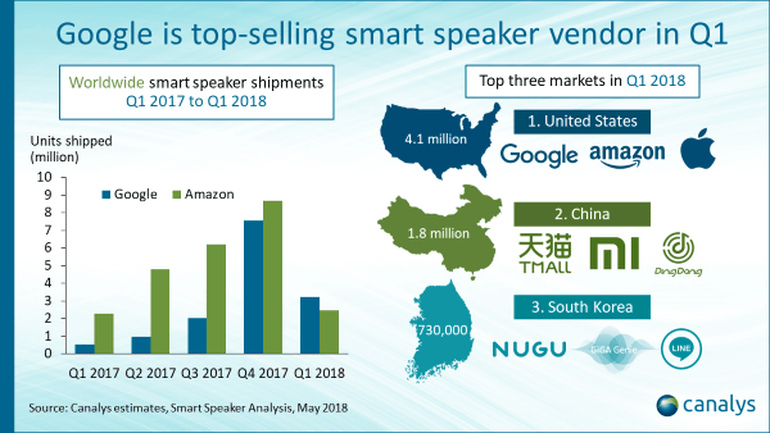Open Innovation at Amazon Alexa: Crowd-sourcing Its Way to Platform Dominance

Amazon is relying on open source innovation to build the capability of its cloud based voice service platform. The voice service is set to be the next biggest technological innovation that will change the way we control devices, interact with machines, and handle information. Amazon is providing a Alexa skills development platform for the third party developers to increase the utility of Alexa and the consequent consumer benefits. What are the next challenges for Amazon's Alexa?
The next big shift in technology that will transform the way we communicate information and interact with our surroundings, including smart objects within the internet of things(IoT) framework, is here: The voice interface. Amazon’s Alexa, launched in 2014, is at the forefront of the ongoing innovation. As a cloud based voice service platform, Alexa powers tens of millions of devices, both from Amazon (Echo, Fire TV, and Fire Tablet) and third parties.[1] This voice service is expected to become the central piece for the e-commerce and the smart home technology.


While Amazon is currently the market leader in smart speakers based on the Alexa platform, Google’s Home service has shown triple digit growth in the first quarter of 2018. In order to maintain market leadership and increase adoption both by the end consumer and other device manufacturers/content providers, promoting open innovation is the key for Alexa’s success.

What is Amazon doing to promote open source innovation?
In the short term, because Amazon cannot solely rely on its internal resources to develop all the necessary capabilities, it is relying on open source through collaborative communities and crowd contests[6] to enhance the capabilities of the technology. The resulting functions are called “skills,” being equivalent to apps for smartphones.

Amazon created a collaborative community to actively support the independent and corporate developers creating skills. An array of system called Alexa Skills Kit(ASK) to support the development and launching process is provided.[9] Based on customer engagement, Alexa Rewards are given out as monetary compensation. Developers can also make money through in-skills purchasing and Amazon Pay, which is voice activated purchasing of products and services on the Alexa platform.[10][11]

Currently, it is using a combination of open source and human crowd sourcing: Multilingual Alexa users are investing their time to teach new languages to Alexa. [14]
Recommendations?
In the short term, to increase adoption and hence the appeal of the Alexa platform, Amazon need to enter strategic alliances with key partners to further reinforce the open innovation. While Alexa is leading the home smart speaker market globally, it is experiencing lack of adoption by automobile manufacturers for the smart car infotainment system. It recently announced integration of Alexa with a small number of automakers on a limited scale.[15] Current Echo Auto add-on provides limited functionalities as opposed to Apple Carplay and Google Auto that rely on the networking and processing power of their mobile device. Car infotainment is a crucial piece to the voice service platform dominance for which Amazon is competing against Google and Apple. Because the open innovation is not taking place naturally, Amazon need to make the strategic move to entice auto manufacturers to joint its ecosystem.
In medium terms, Amazon needs to promote language learning of Alexa with the aim of increasing geographic expansion. Currently Alexa speaks only six languages (English, French, German, Spanish, Italian, and Japanese)[16] and the ability to speak the language is essential for the voice service product to expand globally.

Questions?
How can Amazon achieve the voice service platform dominance against Google (and possible Apple)? What service/product does it need to complement to attract more adoption from the developers/companies/end-users?
How can Alexa enter new markets and expand its user base? What can Amazon do to further facilitate market adoption?
[Word Count 800]
[1] Amazon.com, Inc., “Why build Alexa Skills,” https://developer.amazon.com/alexa-skills-kit, accessed November 2018.
[2], [3] Innovation at Amazon, “Innovation@Amazon 2017: Alexa, a 3P developer perspective,” YouTube, published Apr 19, 2018, https://www.youtube.com/watch?v=RZcyZJEcVO0&t=295s, accessed November 2018.
[4] Day One: The Amazon Blog, “2017 Letter to Shareholders,” https://blog.aboutamazon.com/company-news/2017-letter-to-shareholders/, accessed November 2018.
[5] E-Marketer, Inc., “US Smart Speaker Users, by Brand, 2018 & 2020 (% of smart speaker users),” https://www.emarketer.com/Chart/US-Smart-Speaker-Users-by-Brand-2018-2020-of-smart-speaker-users/218231, accessed November 2018.
[6] K. Boudreau and K. Lakhani. Using the crowd as an innovation partner. Harvard Business Review 91, no. 4 (April 2013): 61–69.
[7] Amazon.com, Inc., “Alexa Skills,” https://www.amazon.com/alexa-skills/b/?ie=UTF8&node=13727921011&ref_=topnav_storetab_a2s, accessed November 2018.
[8] Amazon.com, Inc., “Alexa Prize 2018,” https://developer.amazon.com/alexaprize/apply, accessed November 2018.
[9][12] Amazon.com, Inc., “Alexa Skills Kit” https://developer.amazon.com/alexa-skills-kit, accessed November 2018.
[10] Amazon.com, Inc., “In-Skills Purchasing,” https://developer.amazon.com/alexa-skills-kit/make-money/in-skill-purchasing, accessed November 2018.
[11] Amazon.com, Inc., “Amazon Pay,” https://developer.amazon.com/alexa-skills-kit/make-money/amazon-pay, accessed November 2018.
[13] Day One: The Amazon Blog, “How our scientists are making Alexa smarter,” https://blog.aboutamazon.com/amazon-ai/how-our-scientists-are-making-alexa-smarter, accessed November 2018.
[14] Day One: The Amazon Blog, “Alexa’s newest teacher is you,” https://blog.aboutamazon.com/amazon-ai/alexas-newest-teacher-is-you, accessed November 2018.
[15] The Verge, “ Amazon’s Echo Auto is another quick fix for the broken state of in-car infotainment,” https://www.theverge.com/2018/9/21/17887230/amazon-echo-auto-carplay-android-auto-infotainment, accessed November 2018.
[16] Amazon.com, Inc., “Develop Skills in Multiple Languages,” https://developer.amazon.com/docs/custom-skills/develop-skills-in-multiple-languages.html, accessed November 2018.
[17] Canalys, “Google beats Amazon to first place in smart speaker market,” published May 23, 2018, https://www.canalys.com/newsroom/google-beats-amazon-to-first-place-in-smart-speaker-market?campaignname=googlechirp, accessed November 2018.





This article was spot on with the reason Amazon Echo has been so successful for Amazon versus Google Home or Apple HomePod. Besides the first mover advantage it had on its competitors, it is also the most affordable option. The reason Amazon can make it so affordable is they are betting on the network effects of Alexa. More people want to own an Echo, because of all of the skills it can be used for. And if more people own an Echo, then they are able to make those impulse purchases that Amazon profits from. Forbes came out with a research article in May 2018, that showed that Echo owners on average spend 29% more than non-echo owners due to this “think it, buy it” phenomenon (https://www.forbes.com/sites/johnkoetsier/2018/05/30/40k-person-study-buying-echo-increases-amazon-purchases-29-especially-cpg-items/).
I did not realize that Amazon was open sourcing the language learning component of Alexa, but I’m interested to learn more about this. I agree that Amazon needs to expand this capability if it wants to move outside the United States and gain dominance. I’m interested to see if they would ever consider partnering with a Chinese e-commerce company, such as Alibaba, in order to start promoting Amazon’s brand awareness in China.
This was fascinating to hear how Amazon has adapted open innovation to iterate on its home devices as well as engage with users to built features that matter most. It truly highlights how and why they’ve been able to lead the market in this space. As they continue to expand, I imagine they need to invest more heavily in natural language processing and voice recognition. While this investment requires technical skills, I also think there’s an opportunity to involve the community to help improve the product and build on the existing success of the product. I also wonder how and if emerging markets will care about the design or voice options that Google and Apple index on for their products — if they do not, I anticipate Amazon will continue leading the charge.
I hadn’t realized that Amazon was using open innovation to maintain its competitive advantage in the home smart speaker market. As Apple demonstrated with its app store, I think opening Alexa up to developers that can further Alexa’s capabilities and thus create its utility will be a key advantage as it looks to keep its leader position. However, I do wonder if open innovation is the correct approach when it comes to improving Alexa’s language capabilities. Should Amazon instead explore an M&A acquisition of start-ups that already have the capabilities to do real-time language translation/processing? While Google and Microsoft are definitely at the forefront of these technologies, start-ups like SayHi (https://www.sayhitranslate.com/) and TripLingo (http://www.triplingo.com/) may offer a great foundation from which Amazon can build on to quickly expand the number of languages Alexa can support. From my point of view, acquiring the capability may be a better way for Amazon to accelerate development.
It’s really impressing how Amazon is drastically changing the way we interact with technology by bridging the gap between highly sophisticated technology and regular people who just want to live a better/ more efficient life. In this sense, it is key that Amazon balances the trade off between accelerating the product launch and launching a useful product. Based on my experience, Alexa does not always perform as it is supposed to. It is still a work-in-progress product that was launched due to the pressure of competitors (i.e. Google, Apple). Therefore, Amazon needs to make sure that Alexa is achieving high customer satisfaction levels before even thinking of expanding to new areas.
This is a great article about how open innovation is a key lifeline for Amazon’s Alexa going forward. The author mentioned and described the university contest and different methods Amazon is using in order to promote Alexa platform. Very nicely written.
As far as entering emerging markets, it will have to certainly customize for the region and locality which it desires to enter. I doubt a “one size fits all” approach will work (since each region with it nuances are so different).
Amazon will have to also consider building an open innovation platform in other regions e.g India or China or Brazil, where this a young populace of people savvy in software and programming. Amazon will also have to educate consumers/corporate about the uses and advantages of Alexa and develop local partnerships (in regions and emerging markets where it desires to expand)
Really interesting article — thanks for your work putting this together! One other application that lives that intersection of crowd sourcing and machine learning is using the recordings of commands Alexa is asked and when she makes “mistakes” to help inform what changes need or additions need to be made to the platform. I’m not sure if Amazon is already doing this (even though I have an Alexa myself…) but I would imagine they would run into ethical / legal questions: is it okay to use a recording of someone without their express knowledge or consent in order to improve a product?
This is a very fascinating and elucidating article. In order for Alexa to compete with its competitors, it needs to shift more of its focus to the internet of things and capture the connectivity devices in the home, at work, and in the car. This is where voice recognition will be most valuable in the next 5 years – being able to turn on lights and appliance or play music in a car. By partnering with IoT companies, it can capture this market as the voice recognition industry shifts from early adopters to the early majority. Unfortunately, Google already has a head start here with their acquisition of Nest in 2014.
This is a great article on how Amazon has been able to leverage open source innovation to quickly develop far more skills for Alexa than other voice assistants. One aspect I found a bit misleading is that—though Alexa devices are the most common smart home devices—Siri is still the most used mobile voice assistant. [1] One way Amazon could continue to grow Alexa is by extending the brand beyond voice interfaces, especially for situations where another communication medium may be preferable to voice (e.g. text input when the user is at work). For example, in addition to its voice interface on iOS and CarPlay devices, the Siri brand is also used to represent caller ID, text prompt autocomplete, and traffic reminders before an event. [2]
[1] Mangis, Carol. “Which Mobile Voice Assistant Is Used the Most?” PC Mag, July 5, 2018. https://www.pcmag.com/news/362260/which-mobile-voice-assistant-is-used-the-most, accessed November 2018.
[2] Apple, “Siri,” https://www.apple.com/siri/, accessed November 2018.
Very intriguing and informative article. Amazon indeed is handicapped against the likes of Apple and Google, by not having a mobile platform that a consumer is spending 2+ hours a day on. Hence, in my view Amazon should focus on home users and integrating itself with home automation rather than a mobile personal assistant. The lack of global reach of Amazon compared with the likes of Google and Apple further created a comparative disadvantage to win in this personal assistant dominance battle. On expanding to international markets, the Alexa team needs to conduct R&D in more global markets to tune/tailor products to individual markets, further a reliable 3rd party distribution network should be explored for market entry into potentially lucrative markets.
Great article; thank you for sharing. In reading this, I continue to reflect on what the most impactful use case of this technology is. I have had siri on my phone for days and only use it at night to set my alarm for the next day. Because I imagine that I am pretty unique in my lack of use, I agree with Amazon’s approach which says that it makes more sense to allow people to build the “skills” that are most impactful to them rather than build that functionality itself.
With regards to auto integration, I wonder whether we have thought about the impact more car functionality will have on safe driving statistics?
Thank you for bringing to our attention a very interesting (and arguably commercially successful) use case of Open innovation. Amazon has in the process turned Alexa into a platform, the same way Apple and Google have turned their Apple store and Google Play into sticky platforms for development of 3rd party apps. Unlike some others, I’m not too concerned that Alexa voice assistant usage lags that of Apple and Google. I believe a more accurate metric would be monetization ability, which of course is harder to track and not as openly publicized. In terms of monetization, Alexa has a leg up over Apple Siri and Google assistant because it’s directly plugged into the massive ecosystem of Amazon commerce, while the same cannot be said about Apple or Google. You already bought a massively overpriced Apple iPhone, what else can you buy from Apple on a day-to-day basis?
However, at some point, Alexa will have to move beyond its market in the home. The real challenge then is how Alexa can secure its place as a gateway to Amazon services on the smartphones, while those platforms are controlled by Apple and Google. We can already see Facebook struggling with the same issue, as evidenced by their latest product release of the Portal, e.g., their attempt to more directly control the interface with customers.
Interesting article! It makes sense Alexa started out more as a speaker / entertainment use case, however Alexa’s capabilities can stretch far more. As I think through other use cases, it could be impactful to utilize Alexa in healthcare arenas. For example, recently a small pilot was done in Brockton MA regarding diabetes. This is a low income area with high occurrence of diabetes and low access to healthcare. Alexa could serve as a way to communicate in hospitals and in homes with patients with diabetes to remember to take their meds and reinforce habits.
Great article. I don’t think Alexa will find success competing with Google and Apple in the car space. Google and Apple have connections to mobile devices that are integral for smart car infotainment systems in ways that I don’t think Amazon should even try to compete with them on. After all, the Amazon phone did not work out well. Amazon should compete in the areas it is already good at, such as offering products and services to people all over the world. Amazon is the king of e-commerce in the US and should use Alexa in a way that facilitates the purchase of goods and services from Amazon. While they are already doing this, open innovation will allow them to expand Alexa’s skills to provide more fluid access to the Amazon ecosystem of services. As more and more people rely on Amazon to purchase everything they need for their home, business etc, Alexa will naturally become more important if it can provide easier access to all those goods and services that you need.
Thanks for sharing this! It was interesting to hear more about how Alexa is trying to stay competitive in this market through open innovation and skills development. I definitely can see the benefits of outsourcing the R&D to a wider community that can uncover additional offerings for a diverse user base. I am curious to see how much Alexa is able to improve from using Cleo, their gamified skill within the Alexa app that they launched in March 2018 to encourage non-native English speakers to provide feedback on local dialects (https://www.scmp.com/tech/social-gadgets/article/2138204/amazon-wants-your-help-teaching-alexa-new-languages-and-it-could).
On a different front, the open community approach to developing skills has led to some fruitful efforts to provide sign language reading capabilities. Recognizing that the focus on voice assistance has excluded the deaf community, a developer used the machine learning platform Tensorflow to create a web app that reads sign language through a laptop camera and “speaks” the message to Amazon Echo, then encodes Echo’s response and types it out (see https://medium.com/syncedreview/signing-with-alexa-a-diy-experiment-in-ai-accessibility-57e4407af539). The app seems more like a proof of concept than ready for regular use, but an interesting take on how Echo could differentiate itself and serve an entirely different community of users.
Fascinating article! To answer your question on how to out-beat Google and Facebook, I believe it will be critically important that Amazon look for ways to integrate the Alexa Voice service into other third-party products. Partnerships with voice-enabled consumer products such as televisions, laundry machines, light switches will become important to grab and maintain market share. Amazon should look to the biggest manufacturers and sway them to be their “voice partner of choice” before Google and Facebook beat them to it.
Super interesting article! I had no idea that Alexa opened up its APIs to third-party developers but after reading this piece it’s clear that Alexa would not have gained the traction it has so far without this approach — particularly in terms of coming up with new use cases. In terms of how Alexa can maintain it’s market position moving forward as well, I actually happened to read today about Amazon’s Alexa Fund, a VC fund for fueling the development of voice-based technologies. The announcement (https://techcrunch.com/2018/11/13/amazons-alexa-fund-invests-in-on-demand-parking-service-parkwhiz/) was specifically about an investment in Parkwhiz, a service that integrates with Alexa such that when a user is about to leave their home they can reserve a garage spot at their destination. I find it pretty incredible that Alexa can be used to disrupt traditional spaces such as parking, and it seems like open innovation will continue to play a key role in exploring these use cases.
While using our voice to activate electronics sounds very desirable and convenient, it comes with many risks as well. This means that all of our devices will basically be recording our conversations 24/7 in the living room, in the car, or in the bedroom. This is probably happening already today without us even knowing it is happening as we send a text to a friend or say something to a friend on the phone, and suddenly get relevant commercial to that comment the next day on our browser. All these major internet companies have an enormous amount of data on each and every one of us, and with Alexa becoming more prevalent the situation is becoming worse. I believe to stand out from competition Amazon will have to do an amazing job at showing that it is protecting our precious information and basically not freak the user out with how much information it has on us. While it might have the superpowers to give us an extremely accurate and helpful recommendation it should not in that case that it would freak out the user, and make the user to avoid using the system in the future. Understanding how to make the user feel safe with us storing his or her data is extremely important as a competitive advantage.